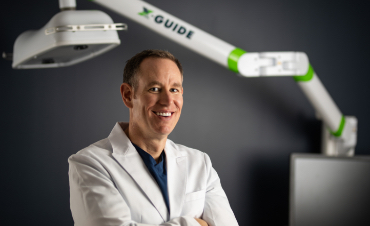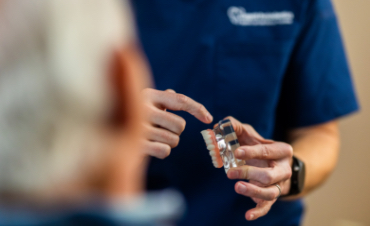 Dental implant placement is one of the most common procedures performed at Derby City Dental Specialists in Kentucky. In fact, this tooth-replacement system is the most popular option on the dental market today. Not only do dental implants provide men and women with a fully functional, natural-looking smile, but they also maintain patients’ oral health and preserve the jawbone. Many people are surprised to hear that during their initial consultation with Dr. Clagett, so we’d like to dive a little further into the question, “How do dental implants preserve the jawbone?”
Dental implant placement is one of the most common procedures performed at Derby City Dental Specialists in Kentucky. In fact, this tooth-replacement system is the most popular option on the dental market today. Not only do dental implants provide men and women with a fully functional, natural-looking smile, but they also maintain patients’ oral health and preserve the jawbone. Many people are surprised to hear that during their initial consultation with Dr. Clagett, so we’d like to dive a little further into the question, “How do dental implants preserve the jawbone?”
The Anatomy of Tooth Roots
It’s no surprise that your tooth roots are what hold your natural teeth firmly into your jawbone. But how exactly does something as “flimsy” sounding as a root manage to hold onto a bone and keep it from falling out? Well, in reality, your tooth roots are far from flimsy. Every time you bite down or chew on something, your tooth roots stimulate your jawbone, which then sends a signal to your body that it needs nutrients to stay strong.
When you lose a tooth, that stimulation stops, and so your body begins to think there’s no reason to keep providing the jawbone with nutrients. Without those nutrients, the bone weakens and loses density – it basically begins to melt away. That’s where dental implants come in, and why they play such an important role in the preservation of your jawbone.
Dental Implants Preserve Your Jawbone
When Kentucky periodontist Dr. Clagett uses dental implants to replace your missing teeth, he will insert a metal rod – usually made from titanium – into your jawbone where your original tooth, or teeth, once were. By placing this rod directly into the bone, it continues to be stimulated, and the body continues to send nutrients to the bone to keep it strong and healthy. Even more, your jawbone actually bonds with the dental implant, which provides a stable and permanent foundation for the crowns that will be placed on top of the implants.
How Can Bone Resorption Occur After Anterior Tooth Loss?
When Dr. Clagett sees Kentucky patients who have lost an anterior tooth – a tooth in the front of their mouth – he is very quick to develop a treatment plan. This is because the jawbone at the front of the mouth is very thin and can deteriorate and resorb quickly. If a missing anterior tooth isn’t replaced, patients will experience noticeable changes to their smile because the bone and gums will visibly collapse.
To prevent this collapse, Dr. Clagett recommends his patients have dental implants placed so the bone can continue to be stimulated by the implant. This is the only way to prevent this visible defect in your smile since no other tooth replacement options preserve the jawbone.
Okay, But Why Would I Need to Replace Missing Teeth in The Back of My Mouth That No One Can See?
We realize that many people don’t understand why tooth replacement is so important for missing back teeth, or posterior teeth. After all, no one can see them, and their absence doesn’t affect your smile.
Regardless of their visibility, the need for jaw stimulation remains the same. In order to preserve your jawbone, dental implants will need to be placed. This will prevent the posterior area of the jawbone from deteriorating and caving in. Therefore, it will preserve the front teeth, if any remain.
Let Our Team Save Your Smile With Dental Implants
If you have missing teeth that need to be replaced, call Dr. Clagett’s office in Kentucky today. He takes pride in being able to help new patients start their road to improved oral health and a beautiful new smile! You can trust him to preserve your jawbone with dental implants, so call his office today!




